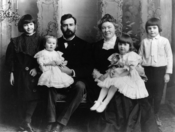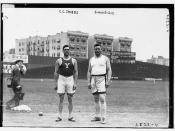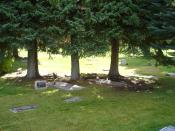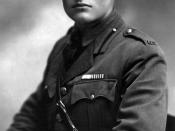How worthy is a human life? For instance, Ernest Hemingway uses the old man in "A Clean, Well-Lighted Place"ÃÂ to describe that a human life is "Nada"ÃÂ which it means nothing (Hemingway 264). King Simon, who wrote the book of "Ecclesiastes"ÃÂ in the Bible, also uses the word "Meaningless"ÃÂ to describe a human life (Ecclesiastes 1.2). Even though these writers found what is a human life are like, these two writers had two different endings of their lives. Hemingway committed suicide to end his worthiness life but King Simon did not. The old man in "A Clean, Well-Lighted Place"ÃÂ, Ernest Hemingway shows the connection between the family, wealthiness, and work with King Simon in the book of "Ecclesiastes"ÃÂ in the Bible.
First of all, the family does not make a human life worthy. Many people think that having family gives a worthiness of human. However, Hemingway and King Simon show the examples that the family does not make a human life worthy through their work and lives.
For example, the old waiter in "A Clean, Well-Lighted Place"àsays that the old man had a wife once, and she is not any good to the old man (Hemingway 262). Beside, Hemingway married times; however Hemingway himself committed suicide, and his family also died at their hands that they did not find worthiness from their family (261). In addition, King Simon says, "I acquired men and women singers, and a harem as well "àthe delights of the heart of man "æ Yet when I surveyed all that my hands had done and what I had toiled to achieve, everything was meaningless, a chasing after the wind; nothing was gained under the sun (Ecclesiastes 2.9-11)."àSecondly, the worthiness of a human life is coming from the wealthiness. Many young people say that richness or wealthiness brings a worthiness of human life, but it is a wrongful though. Hemingway and his character, the old man in "A Clean, Well-Lighted Place"ÃÂ, are rich. The old waiter says that the old man has plenty of money (Hemingway 261), although Hemingway uses the word "Nada"àto describe a human life. King Simon, who was a king of Israel, had every matter that he wanted. King Simon had most wisdom and wealthiness than any other kings in Israel; however he says that a human life is meaningless. King Simon says, "I also owned more herds and flocks than anyone in Jerusalem before me "æ I became greater by far than anyone in Jerusalem before me. In all this my wisdom stayed with me (Ecclesiastes 2.7-9)."àFinally, the life work does not bring worthiness to a human. Hemingway achieved many great works through his life. For instance, he wrote many short stories and novels. In addition, he was awarded the Novel Prize. King Simon also achieved many works. He built the temple of God and houses for himself; he undertook great projects and planted vineyards; He made gardens and parks (Ecclesiastes 2.4-5). These two writers spend their lifetime to gain worthiness, however these writers conclude that a human life is "Nada"àor "Meaningless"ÃÂ.
A human life is to find or achieve worthiness. Through these writers, the worthiness is not from family, wealthiness, and work of a human life. These writers had similar thoughts, however, Hemingway committed suicide to end his life himself, but King Simon did not. In conclusion, King Simon shows what make him to differ from Hemingway. King Simon says, "Now all has been heard; here is the conclusion of the matter: Fear God and keep his commandments, for this is the whole duty of man (Ecclesiastes 12.13)."ÃÂ





